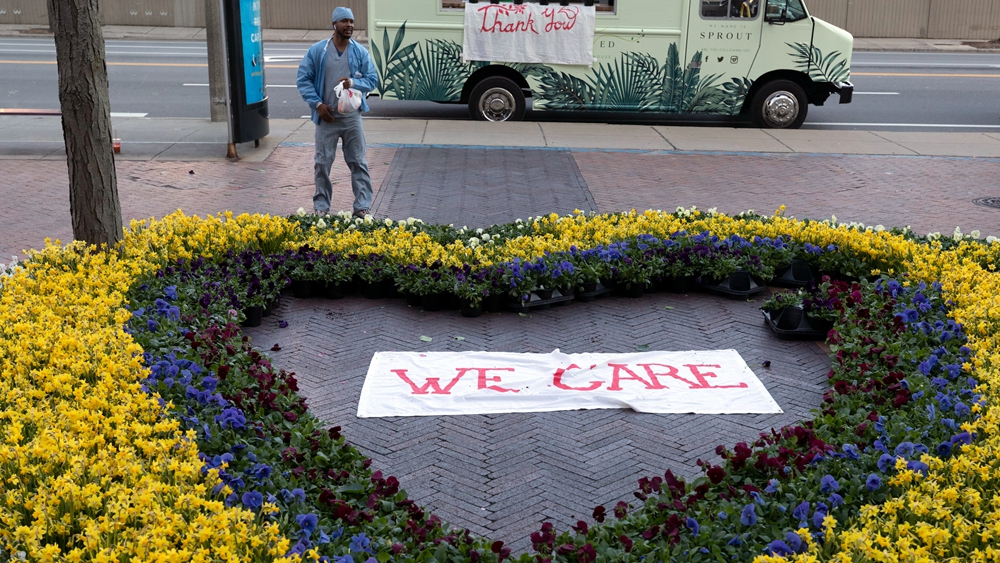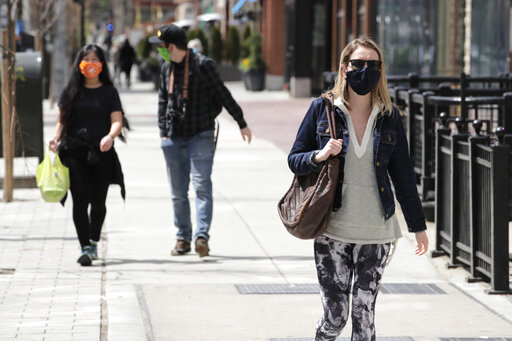
Locals arrange flowers in the shape of a heart to show their appreciation for medical workers in Boston, United States, April 10, 2020. /AP
Locals arrange flowers in the shape of a heart to show their appreciation for medical workers in Boston, United States, April 10, 2020. /AP
Editor's note: This is the first story of a two-part feature showing how individuals with perspectives from a different culture keep their lives normal while helping the community during the COVID-19 pandemic, and also their experiences of compassion and solidarity in this time of crisis.
For the past month, Wang Yanxi has been sharing tips and advice about protecting oneself against COVID-19 with friends in the U.S. from her home in Boston, Massachusetts.
"In case you wonder how serious the Chinese are about social distancing, here's a photo of my cousin in Wuhan picking up a package from downstairs," she posted on Facebook with a photo of a Chinese man wearing a face mask, goggles, a face shield and a raincoat. "That's how the number of cases decreased there."
But when Wang first learned about the coronavirus in mid-January, the 35-year-old mother of two could never have thought the Chinese city she grew up in would soon be the subject of international news about a deadly infectious disease.
"When friends in the U.S. asked me about Wuhan at the time, I even told them the media were exaggerating things," said Wang, who moved to the U.S. from Wuhan, China more than 10 years ago.
"Go Wuhan!" from overseas
But it didn't take long before it emerged that the novel coronavirus was contagious, followed by the unprecedented lockdown of Wuhan, the early epicenter of the outbreak, in the midst of the Chinese New Year travel rush. That also affected Wang's family thousands of miles away in the U.S.
Wang's parents who had been visiting from China planned to return to Wuhan in March. Since the city was under siege from the coronavirus outbreak, Wang discussed with her family about changing their travel plans. As travel restrictions between the two countries came into effect at the end of January, their flights were canceled.
It was a time when the phrase "Wuhan Jiayou!" (Go Wuhan!) was echoed around China and in every Chinese diaspora pocket around the world. When doctors in Wuhan appealed for public donations of medical supplies, many overseas Chinese, including Wang, rushed to their aid with what they could manage.
"Many people, Chinese, Americans and people from other countries, all helped with purchasing face masks to send to China," she told CGTN. Wang recalled one time when she was out looking for face masks, the staff at a local drug store immediately understood why she needed them. "Without me asking, they said they will help me search for more masks in their inventory. I was really moved," she said.
Fast forward to early March, when Wuhan had just turned a corner in its epidemic battle, COVID-19 had already spread to many countries around the world including the U.S.

Pedestrians wear protective face masks in the street of Boston, United States, April 15, 2020. /AP
Pedestrians wear protective face masks in the street of Boston, United States, April 15, 2020. /AP
Every help counts
The official numbers of confirmed COVID-19 cases in the U.S. were a few hundreds at the time, but many in the Chinese community, who had kept a close eye on the outbreak in China, were alarmed by the increasing number of new infections. Some living on the west coast have been working from home since early March, before state governments started locking down cities and issuing stay-at-home orders, Wang said.
"It was on March 10 I picked the kids up from school and we stayed home since. I think we were among the first to do that, because everything still seemed normal outside then," she told CGTN.
Wang explained that it's more difficult to keep people at home or enforce practices like mask-wearing in the U.S. because of the country's culture of individualism. "A lot of people here see disease prevention as a personal choice, but people are also paying more attention to their hygiene habits. So it's more relaxed," she told CGTN.
But some groups in the country are particularly at risks, she noted. Healthcare workers across America are running low on personal protective equipment (PPE). Meanwhile, infections have spread quickly in areas that have a high concentration of ethnic minority residents, who tend to live with large families, and there are also those who work day jobs and don't have the luxury of working from home.
As the situation escalated in the U.S., Wang and another friend from China decided to take it upon themselves to help. They began by putting together a spreadsheet with detailed instructions on how to organize volunteers for the local community, taking a page from the on-the-ground experience of civilian groups that helped deliver medical supplies to Wuhan in January and February.
"A lot of people want to help. Elderly people living alone, single mothers, and medical workers' families are all on their neighbors' minds. As long as someone asks, help is on the way," Wang said.
Despite their good intentions, Wang noticed that her local volunteer groups were nowhere as efficiently coordinated as what she saw in China. This was largely due to the scale of organization and the resources volunteers had to work with. "They are mostly small-scale, individually organized," she explained, attributing this also to the individualistic culture of American society.
But every little help counts in tough times. After appealing online for donations of medical supplies for U.S. healthcare workers in March, last week Wang saw the first batch of face masks and PPE donated from China arrive at her doorsteps. These supplies had to be sent in many small packages because the shipment allowed a maximum of 100 masks per package.
In early April, China lifted travel restrictions on Wuhan after a 76-day lockdown. Far away in Boston, Wang couldn't hide her excitement as she took to social media to share the good news. "I'm so proud of my hometown!" she wrote. If history is any indication, and knowing what her home city has gone through, the Wuhan native is hopeful that her new home will come out the other side, too.